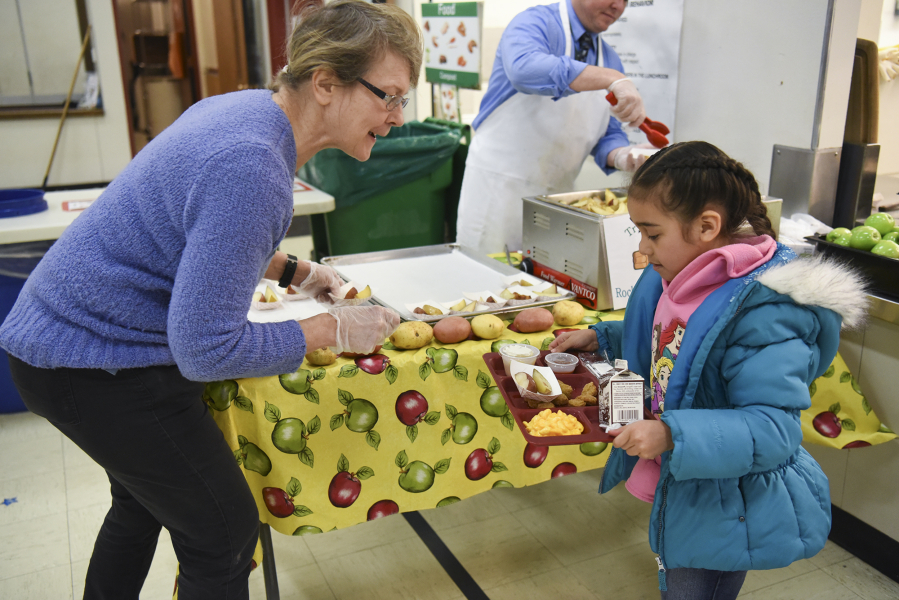Lunchtime at Burton Elementary School had a new feature Monday: a taste test.
After picking up their lunch trays, kindergarten through fifth-grade students were given two “Rockin’ Roasted Potatoes” — one red potato wedge, one Yukon potato wedge — to sample. Some were excited to see a familiar food, though prepared in a way they may not be used to. Others were not happy about the offering.
“I only like potatoes if they’re french fries,” one kindergartner said.
The potato wedges were served as part of the Farm to School program offered through a partnership between Washington State University Extension’s SNAP-Ed, Evergreen Public Schools, food service provider Chartwells and nonprofit Ecotrust. SNAP-Ed, which stands for Supplemental Nutrition Assistance Program Education, provides nutrition education in classrooms in schools with 50 percent or more of their students receiving free or reduced-price lunches.
“Our goal is really around obesity prevention and helping to reduce chronic disease,” said Kristine Perry, a program manager with the WSU Extension. “Ultimately, it’s around supporting schools and kids around healthy eating and physical activity.”
The partner organizations came together to try to encourage more fruit and vegetable consumption at the schools. While Chartwells made changes to its menu to follow revised U.S. Department of Agriculture guidelines, such as adding a fruit and veggie bar in the lunchroom, students weren’t always taking the offerings.
“It’s not nutrition if they’re not eating it,” Perry said.
So the group brainstormed and came up with the Farm to School program. Every month, the group selects a regionally grown food, the Harvest of the Month, and prepares samples for a taste test at one elementary school. The food comes from regional farms — both potatoes came from Mount Vernon — and educators explain the role of local produce in the food system.
Teachers are also given the information about the farms and fun facts about the Harvest of the Month, as well as recipes that can be given to parents.
While the tasting events are only at one school each month, the bulletin boards and educational pieces are provided to every elementary school served by the program. And, if the food goes over well, it gets added to the menu at all elementary schools.
“So far, it’s just an overwhelming, really positive response,” Perry said.
While many of the kids at Burton Elementary were familiar with potatoes, several said they don’t usually eat them roasted.
“My favorite is mashed potatoes,” said first-grader Katrina Engel. “My dad makes them sometimes.”
Seven-year-old Melinah Morales has tried potatoes prepared many different ways — mashed, baked, even roasted — but she was eager to try the two varieties on Monday. After nibbling on the wedges, she gave both a thumbs up.
“This is really good,” she said.
Chad Kirby, Chartwells’ food service director for Evergreen elementary schools, said the potato wedges will get added to the menu next month — just as other popular taste-test foods have. In December, for example, students tried hummus for legumes month. Now, hummus with veggie sticks is in the regular rotation. And in January, kale was mixed with Romaine lettuce for a Caesar salad. The mixture is now available in the lunchroom salad shakers.
“We have that stigma that it’s school food,” Kirby said. “You’d be surprised what we’re serving here.”




